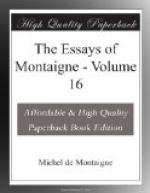“Quo timoris minus est, eo minus ferme periculi est.”
["When there is least
fear, there is for the most part least
danger.”—Livy,
xxii. 5.]
Our people are to blame who say that such an one is afraid of death, when they would express that he thinks of it and foresees it: foresight is equally convenient in what concerns us, whether good or ill. To consider and judge of danger is, in some sort, the reverse to being astounded. I do not find myself strong enough to sustain the force and impetuosity of this passion of fear, nor of any other vehement passion whatever: if I was once conquered and beaten down by it, I should never rise again very sound. Whoever should once make my soul lose her footing, would never set her upright again: she retastes and researches herself too profoundly, and too much to the quick, and therefore would never let the wound she had received heal and cicatrise. It has been well for me that no sickness has yet discomposed her: at every charge made upon me, I preserve my utmost opposition and defence; by which means the first that should rout me would keep me from ever rallying again. I have no after-game to play: on which side soever the inundation breaks my banks, I lie open, and am drowned without remedy. Epicurus says, that a wise man can never become a fool; I have an opinion reverse to this sentence, which is, that he who has once been a very fool, will never after be very wise. God grants me cold according to my cloth, and passions proportionable to the means I have to withstand them: nature having laid me open on the one side, has covered me on the other; having disarmed me of strength, she has armed me with insensibility and an apprehension that is regular, or, if you will, dull.




